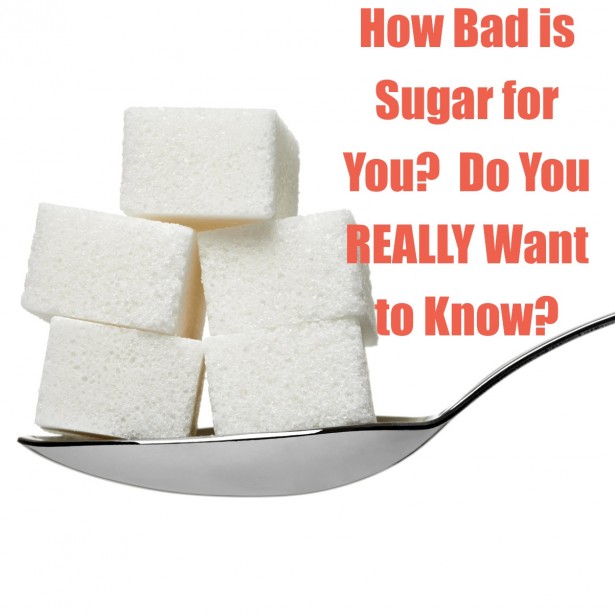How Bad is Sugar for You? Do You REALLY Want to Know?

Some questions just shouldn’t be answered.
It’s not because they’re bad questions.
But nobody is going to like the answer.
And that’s very true of sugar. Because, after all, who doesn’t like sugar. Writing about sugar is sort of like kicking kittens. It’s not a popular thing to do.
Sugar is Complicated
Like most health and nutrition questions, the answer isn’t particularly simple.
A lot depends on what your goals are, how broken your body is, and what type of sugar we’re talking about.
 In general, it makes sense to differentiate between processed sugar and sugar that naturally occurs in food.
In general, it makes sense to differentiate between processed sugar and sugar that naturally occurs in food.
For instance, the sugar that you add to baked goods is processed (as is corn syrup, dextrose, coconut sugar, most honey, etc.).
On the other hand, the sugar in fruits and other foods (sweet potatoes, whole coconuts, etc.) is not processed.
While each type of sugar is not very different chemically, it makes a difference for your body. Unfortunately, pretty much all of the scientific evidence points to one big conclusion…
Processed Sugar is Highly Detrimental to Humans
Here’s how:
1. Nutrient Deficiency. Processed sugar typically has all nutrients stripped from it (while whole foods that contain sugar still have those nutrients). This is more than just an “empty calories” effect.
When you eat sugar, your body has to digest and process it. That digestion and processing requires vitamins and minerals (like chromium, magnesium, zinc, etc.).
If you regularly eat processed sugar that is stripped of all those nutrients, then you’re forcing your body to use whatever vitamins and minerals it has stored in order to process the sugar. And in the end, you probably aren’t refilling those stores enough, leading to micronutrient deficiencies.
2. Overeating. We don’t talk about calories or eating too much very often in the Paleo world, but gorging yourself is generally not a healthy thing to do (particularly on food that is low in nutrients and high in toxins).
When you eat processed sugar, many clinical studies have shown that you end up overeating without even trying. This does not happen when you eat fruits or other whole foods that contain sugar.
There are a few reasons for this phenomenon (one is #3 below), but the end result is that you eat more food than your body needs. This leads to a variety of problems (obesity, insulin resistance, etc.).
3. Addiction. Plain and simply, processed sugar is addictive. And evolutionarily, this makes sense. Sweet foods in nature tend to be safe to eat (and often calorie-dense), so when food is available, you’d want to eat as many of these foods as possible to avoid famine at a later time.
In the modern world, food scarcity is not an issue for many of us, so being addicted to processed sugars is less than ideal.
It’s Up to You
Those are just a few of the reasons that processed sugar is generally a problem and is not considered Paleo. From a basic perspective, it’s very low in nutrients and relatively high in toxins.
In addition, though, a lot depends on you and your goals. If you’re young, in great shape, and are very active, then you can almost definitely handle more sugar than if you’re older and more sedentary. And if you’re diabetic, then even natural sugars – such as in fruits – are probably best avoided.
As you can see, it’s a tricky subject. Personally, I avoid all processed sugar apart from a little dark chocolate once in a while. I can probably tolerate more sugar than I currently ingest, but really, I don’t miss it, and there would be practically zero nutritional or health benefits to eating more.
Images: Copyright (c) picsfive from Fotolia and narstudio from Fotolia

